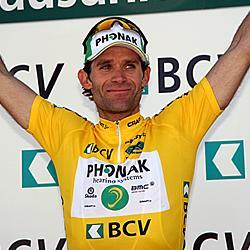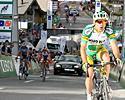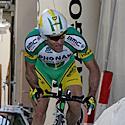
Recently on Cyclingnews.com |
An interview with Santiago Botero, May 3, 2005
The time of my life
Three stages and the mountains jersey at the Tour de France, five stages of the Vuelta a Espańa, victory in the Classique Des Alpes and world time trial champion, to name just a few. And now the final stage and overall victory at the Tour de Romandie. So which win rates as his best? Anthony Tan discovers that time is now.

|
"Now, I think I am the happiest man in the world - this is the best success in my life," said Botero to Cyclingnews somewhat surprisingly soon after the race had finished. "Even in comparison to any race [I've done well in] - the Tour, Olympics, world championships... this is the most important success."
Wow.
Compared to Botero's other achievements, which followed a natural progression of success, his victory on Sunday in Lausanne broke a two-year and six-month dry spell, his last being the 2002 world road time trial championship in Zolder, Belgium.
The rainbow jersey, coupled with three Grand Tour stage wins that year, led to a number of lucrative offers, and after six years with Kelme, the team he started out his professional career with back in 1997, Botero opted for T-Mobile. The idea was that the man from Medellin, situated 430 kilometres northwest of Bogota, Colombia, along with Andréas Klöden and Alexandre Vinokourov, were to spearhead a three-pronged attack in an attempt to derail Lance Armstrong's perennial success at the Tour de France.
That didn't happen. Vinokourov did very well, winning a stage and finishing third overall, but Klöden dropped out during the ninth stage, and Botero did the same one week later, a result of ill health and poor form.
The following year, with Ullrich back in the team in 2004, and Klöden riding exceptionally well, Botero's role was more clearly defined to that of lieutenant, but he struggled to be there when he was needed, leading to a parting of ways with T-Mobile and what would be hopefully a new lease of life at Phonak.
As he had done the previous five seasons, he returned to his home in Colombia, 2,700 metres above sea level, and began training again. But this time, it felt different.

|
"When I was training [in the off-season], I felt I was recovering day after day. I know my body now; I felt good legs, I had good dreams, good sensations, and a good appetite," Botero recalled. "The tests were saying the stomach was getting better and better every day, and now it is good."
Asked if he changed his training program, Botero shook his head: "No, no - the same preparation in 2000, 2001, 2002, 2003, 2004... " - his comment bringing laughs all round.
"My body now is good, my health is perfect. I repeat: in this sport, you need your body in 100 percent [condition]; a small problem can reduce your performance by 25 percent, and this happened [to me] the last two years. I have done the same [training]; the difference now is motivation - because I now know the training, the discipline, the sacrifice, has one result. Before, I always trained, but no result, and that wasn't good for my motivation."
Motivated indeed: 16,000 kilometres of motivation in three months, to be precise, and each day having to ride up a 16 kilometre-long climb back to his home. "I think this is one point in my favour in comparison with the others, and when it was summer in Colombia, the winter in Europe was hard," he said to Cyclingnews.
However, despite these renewed sensations, and with his weight a little down on previous years, 'Santi' didn't get back into racing too soon. Phonak owner Andy Rihs believed in him, and despite all the bad publicity the team was having as a result of the Hamilton/Perez doping affairs, they didn't push him.
"Phonak has given me all the freedom; choice in my calendar, choice in my training... they trusted me. I was here to work for [Oscar] Pereiro, for Alex Moos, but after each day, I felt better and better."
At the prologue in Geneva, the Colombian was only the team's fifth-best rider behind his team-mate and stage winner Pereiro. But on the decisive third stage from that finished atop Anzčre, 1,526 metres above sea level - more than a kilometre below where he comes from - Botero bided his time until he was the only Phonak rider left in the final quintet. Eventually finishing third behind Damiano Cunego (Lampre-Caffita) and Denis Menchov (Rabobank), his placing was good enough to give him the yellow jersey, and as a consequence, he became the clear favourite for overall victory.

|
From there, his team thwarted offensive tactics from Liberty Seguros and Lampre-Cafitta the following day at Châtel-St-Denis, which put Cunego into the lead, but only marginally. And with just a 20.4 time test remaining, even 'The Kid' was doubtful of his chances: "against Botero in the chrono ... I don't think so!" laughed Cunego at the time.
Kid Cunego did his best, placing fourth, but Botero did better, winning the stage and stamped his mark on the race with the authority of a true leader and a man reborn. One word - brilliant. "I think we won this race because of the work of the team - everyone worked incredibly well, and gave it their all for me," said Botero.
Still in his cycling prime, the possibilities appear endless for the 32 year-old, but as Botero says: "The first objective is the Tour de France."
"I will do the Vuelta Catalunya, and then the Tour de France. Phonak is a strong team with Floyd [Landis], Oscar Pereiro, [José Enrique] Gutierrez, [Victor Hugo] Pena is possible, Bert Grabsch... The important thing is that in Phonak, no-one [person] is 'the' team; it is a strong team for the team time trial, and for the rest of the race."
"I think it is very nice [situation], because there are many nationalities - Slovakia, South Africa, Switzerland, Spain... There are no big stars; everybody is... 'free' and on the same level, and that is important for the morale."
